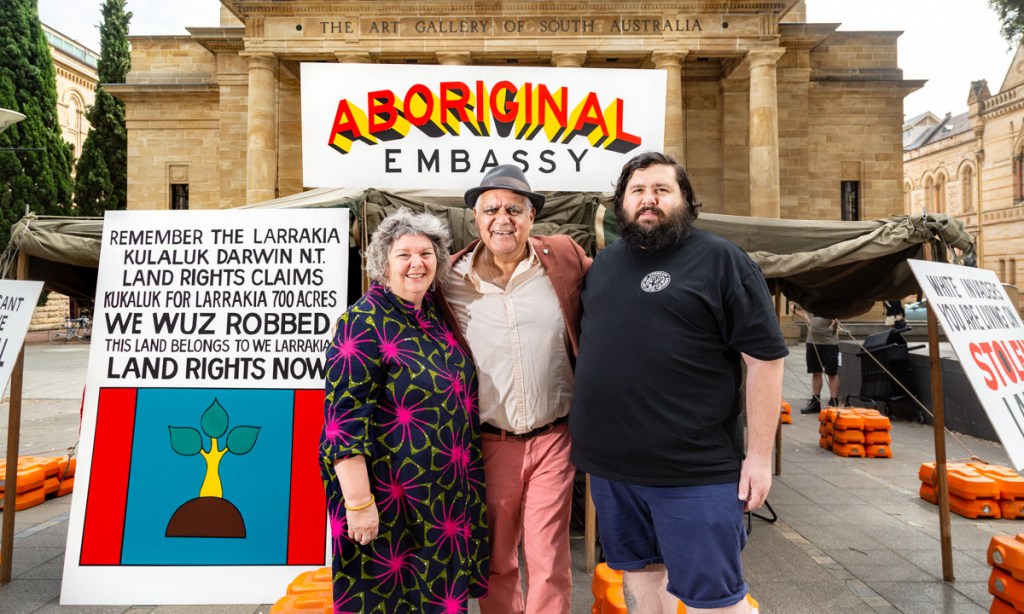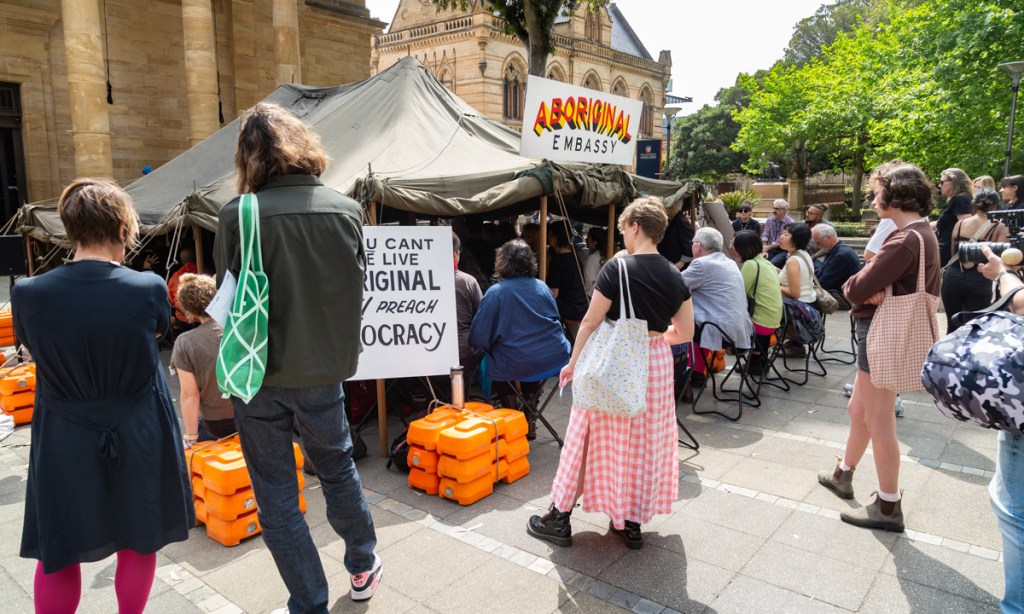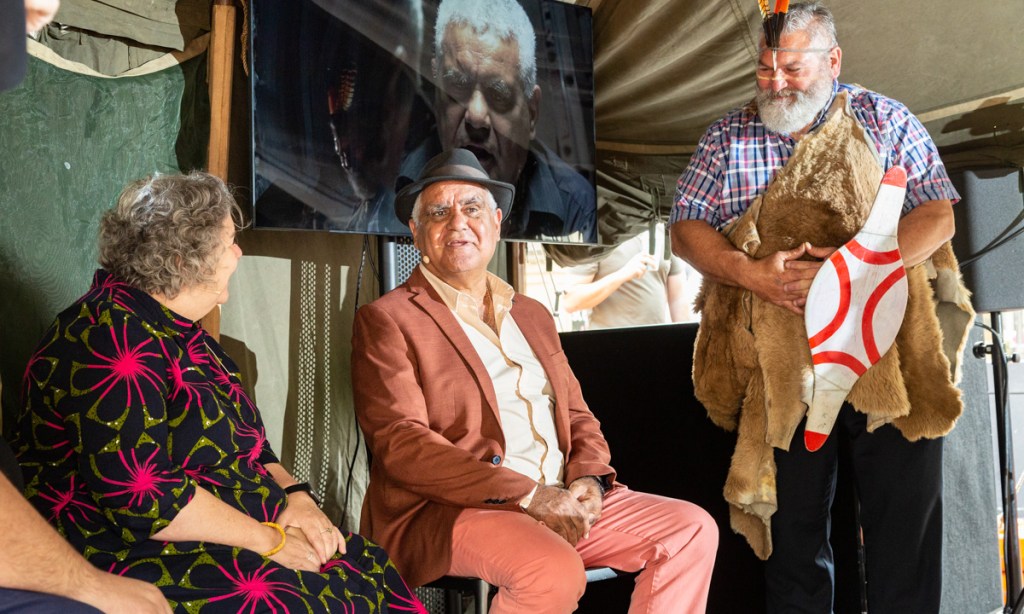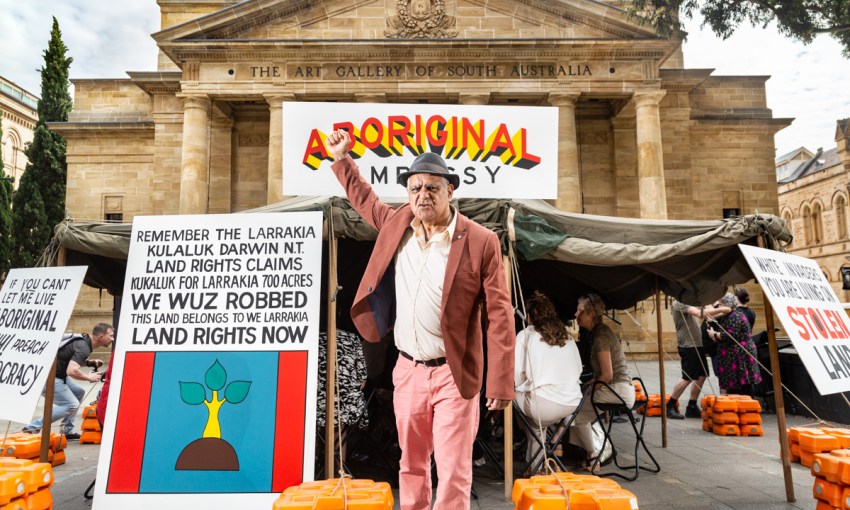Programmed in collaboration with Ngarrindjeri and Kaurna artist Dominic Guerrera, and supported by Tarnanthi and the Adelaide Film Festival, Richard Bell's internationally acclaimed installation featured film screenings and "uncomfortable" discussions.
‘Embassy’ upholds legacy of First Nations sovereignty and protest
Even before its associated program begins, Embassy, an installation from the artist Richard Bell, is a powerful presence in the forecourt of the Art Gallery of South Australia (AGSA).
A painted sign on the front of the canvas tent reads ‘Aboriginal Embassy’ – a nod to the legacy of the Aboriginal Tent Embassy, a protest camp set up on the lawns of Parliament House on unceded Ngunnawal Country (Canberra) 50 years ago.
Embassy, held over the weekend of 21 to 23 October, is a “sign for change”, artistic director of the festival Nici Cumpston says, speaking to CityMag on a bench in the gallery’s forecourt.
Paying homage to its namesake, the canvas tent is surrounded by several painted protest signs. One reads ‘IF YOU CAN’T LET ME LIVE ABORIGINAL WHY! PREACH DEMOCRACY’.
Also part of the Adelaide Film Festival, the Embassy tent brought together artists and community organisers for public talks, and featured film screenings between the conversations.
For Richard, the whole idea of Embassy – which was first staged in 2013 and has toured nationally and internationally since – is to “address the issues at hand”. And the wide-ranging program, curated in collaboration with Ngarrindjeri and Kaurna artist Dominic Guerrera, did just that.
With the exception of the first talk of the day, Dominic says he was given the creative freedom by the Tarnanthi team to curate the rest of the program. As with his previous curatorial work, he says his programming centred the needs of Aboriginal audiences.
“I’m always going to be thinking, ‘What do the Aboriginal communities want to hear, need to hear? What’s the conversation we need to be having?’” he says. “But then, that’s always going to be beneficial to any other community.”
Nici says opportunities to hear from Aboriginal people “where they are supported to say exactly what they think” are “few and far between”.
“It’s just wonderful to give people here a chance to be able to express themselves and now be part of the archive of Embassy,” Nici says.
“Each session in Embassy is recorded. Their voices will be able to be heard forever.”

L—R: Nici Cumpston, Richard Bell and Dominic Guerrera
Dominic tells us the Aboriginal Tent Embassy is “one of the most significant, if not the most significant moment in Aboriginal protest history”.
“It put into action a lot of the philosophies around self-determination and created so much from it, including the Aboriginal community-controlled health sector,” he says. “Sadly, a lot of that stuff has actually been eroded over time.
“We have to keep fighting just to maintain what those activists and community organisers created back then – and also continue to build. It tells me that we have double the work to do.”
Dominic says Embassy is the first time Latoya Rule has been asked to speak in South Australia on the successful campaign they led – along with their family – to legislate a state-wide ban on the use of spit hoods in prisons, police custody and mental health settings.
South Australia is the first to implement this, which Dominic says is “huge”, especially given other states and territories are now taking similar steps.
“Locally, it’s not being recognised for the great achievement that it is,” he says.
On Saturday afternoon, CityMag ducked into the tent to find a stool. The front and sides of the tent are rolled up to let in the sunlight. The speakers sit in front of us, a wall of canvas behind them.
Before introducing artists James Tylor and Matt Chun, Dominic speaks about the significance of the site on which the tent stands.
“Uncle Lewis O’Brien speaks about this as well, about how this was our space for teaching, education, arts and learning and how the colony basically built over the top of that and mimicked it,” Dominic says. “But there’s also been a rich history of resistance along here, as well as brutality from the colony.
“And while it’s one thing to acknowledge Country, you also have to acknowledge the people and stories that are connected to that Country – because that’s why you’re actually acknowledging Country.”
Speaking to CityMag before the talk, Dominic says he asked the duo to discuss their truth-telling project Unmonumental because it’s “pushing back on the dominant discourse of the colony”.
“It’s a clear demonstration of the power of art and how it could communicate and re-educate people and be this force of truth-telling,” Dominic says. “We don’t always have to sit on the streets – there are other ways that we can protest.”
For Dominic, Unmonumental is a coupling of Matt’s articulate artistry and James’ love for research. He says James’ work – which includes making Kaurna tools and weapons – involves bringing knowledge “out of the archives” and museums.
“By James doing that, he’s reclaiming authority over our culture and also rejecting their authority over our culture,” Dominic says.
“It is now part of a cultural revival – and that’s also resistance, as well as protest.”
While there “an incredible wealth of Aboriginal artists” who make this kind of art, Dominic hopes Embassy’s program inspires more such work.
“I would love to see cultural institutions centring that – or even just exhibiting it.”

For non-Indigenous people, truth-telling projects like Embassy are an opportunity “to learn to engage with the un-comfortability” of the issues faced by Aboriginal people, Dominic says.
“If we centre white people’s comfortability in any of our work, then it’s automatically failing,” he says.
“The things that we are faced with are uncomfortable for Aboriginal people: living with chronic illness is uncomfortable, dying 10 years earlier than the rest of the country is uncomfortable. Living in poverty, being incarcerated and being killed or dying while in custody is uncomfortable. The grief that we live with is uncomfortable.
“I want to push local Aboriginal people – the Nunga community – back to a time when we centred Aboriginal ways of doing and being, where we don’t put white people’s needs before our own. Especially when it comes to creating Aboriginal spaces.”
Queer Mob – the final talk on the Embassy program – highlighted the histories and enduring legacies of such spaces, through a conversation between activists and community organisers Violet Buckskin, Keenan Smith, and Dominic.
It’s raining outside the tent, and cars whoosh past on North Terrace as Dominic introduces the talk.
“As a queer Aboriginal person myself, I had to make sure there was space here for the queer Aboriginal voice to come through among all the other unapologetically pro-Nunga voices,” Dominic says.
Truth-telling is a common thread throughout the discussion.
“Truth-telling needs to start now,” Violet says. “What you’re going to hear is going to be horrible – it’s what we have to live with.
“I may be a queer woman, but one thing I need to reiterate everywhere I go, I’m a fucking Aboriginal woman. I’m a Narungga woman, I’m a Ramindjeri/Kaurna woman before I’m queer,” Violet says.
From the audience, Narungga woman and poet Natalie Harkin asks the speakers about their thoughts on the truth-telling responsibilities of governments and organisations, which continue to enact violent policies.
“We’re continually out here telling our stories,” Keenan says in response. “But where is it on the state and the systems to do the same? They’re not sharing the full truth with us.
“At some point the system needs to change. A lot of us are sick of repeating the same things in different ways.”
Responding to another question, Keenan says there is a lot of work to be done in terms of mainstream queer spaces committing to racial justice.
“I think people blur the line between race, sex and gender,” they say. “For us mob, we’re constantly having to change our strategy.
“We’re doing all this extra work to fit into a space that doesn’t want us. Where are they doing that work?”

Speaking to CityMag before the event, Dominic reflects on protest at large needing to “have results for our communities” by focussing on self-determination.
“We need to become gutsy again,” Dominic says. “I think we really got to get back to that grassroots kind of movement.”
Embassy coincides with the world premiere of award-winning filmmaker Larissa Behrendt’s documentary You Can Go Now, also showing as part of the Adelaide Film Festival and featuring Richard Bell’s expansive career.
For Dominic, the documentary speaks to the “power of the Tent Embassy” and the conversations it has mobilised across the world.
“It’s really quite mind-blowing how far it’s reached, and the types of conversations [Richard’s] having,” Dominic says.
“It’s just a propped-up tent – physically, it’s really not that special. But what happens inside of it is.”
Dominic says You Can Go Now is a reminder of the “staunchness of past activists” and the bridges they built.
“There’s a beautiful story in [the documentary] about the connection between the Aboriginal rights movement and the Black movement in Turtle Island in the US,” he says. “We can actually continue to build those bridges.
“I see that particularly in the spoken word poetry scene – there’s so much solidarity in the racism that’s experienced, the oppression, the poverty. But we need to move beyond just being connected based on oppression and actually turn that into action.”
Richard’s work is igniting much-needed conversations that reach beyond the Australian art scene and into broader society, Dominic says.
“He is making sure that the issues that we are facing with Aboriginal people are not forgotten and that people are addressing those issues,” Dominic says. “He is someone that I have a deep, deep respect for.
“He was there in Redfern. He was there at the Tent Embassy. This is a person who has dedicated his life to the Aboriginal social justice movement and his work represents that.”
Richard Bell’s Embassy ran at AGSA’s North Terrace forecourt from Friday 21 to Sunday 23 October.
Also part of the Adelaide Film Festival, Larissa Behrendt’s You Can Go Now will screen again at 3pm on 30 October.




